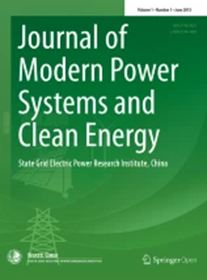Optimized Auxiliary Frequency Control of Wind Farm Based on Piecewise Reduced-Order Frequency Response Model
IF 5.7
1区 工程技术
Q1 ENGINEERING, ELECTRICAL & ELECTRONIC
Journal of Modern Power Systems and Clean Energy
Pub Date : 2023-09-19
DOI:10.35833/MPCE.2023.000448
引用次数: 0
Abstract
With the increasing wind power penetration in the power system, the auxiliary frequency control (AFC) of wind farm (WF) has been widely used. The traditional system frequency response (SFR) model is not suitable for the wind power generation system due to its poor accuracy and applicability. In this paper, a piecewise reduced-order frequency response (P-ROFR) model is proposed, and an optimized auxiliary frequency control (O-AFC) scheme of WF based on the P-ROFR model is proposed. Firstly, a full-order frequency response model considering the change in operating point of wind turbine is established to improve the applicability. In order to simplify the full-order model, a P-ROFR model with second-order structure and high accuracy at each frequency response stage is proposed. Based on the proposed P-ROFR model, the relationship between the frequency response indexes and the auxiliary frequency controller coefficients is expressed explicitly. Then, an O-AFC scheme with the derived explicit expression as the optimization objective is proposed in order to improve the frequency support capability on the premise of ensuring the full release of the rotor kinetic energy and the full use of the effect of time delay on frequency regulation. Finally, the effectiveness of the proposed P-ROFR model and the performance of the proposed O-AFC scheme are verified by simulation studies.基于分段降序频率响应模型的风电场辅助频率优化控制
随着风力发电在电力系统中的渗透率不断提高,风力发电场(WF)的辅助频率控制(AFC)已得到广泛应用。传统的系统频率响应(SFR)模型由于精度和适用性较差,并不适用于风力发电系统。本文提出了一种片式降阶频率响应(P-ROFR)模型,并基于 P-ROFR 模型提出了风电场辅助频率控制(O-AFC)优化方案。首先,建立了考虑风机运行点变化的全阶频率响应模型,以提高适用性。为了简化全阶模型,提出了具有二阶结构且各频响阶段精度较高的 P-ROFR 模型。基于所提出的 P-ROFR 模型,明确表达了频率响应指标与辅助频率控制器系数之间的关系。然后,提出了以推导出的明确表达式为优化目标的 O-AFC 方案,以在确保充分释放转子动能和充分利用时间延迟对频率调节作用的前提下,提高频率支持能力。最后,通过仿真研究验证了所提 P-ROFR 模型的有效性和所提 O-AFC 方案的性能。
本文章由计算机程序翻译,如有差异,请以英文原文为准。
求助全文
约1分钟内获得全文
求助全文
来源期刊

Journal of Modern Power Systems and Clean Energy
ENGINEERING, ELECTRICAL & ELECTRONIC-
CiteScore
12.30
自引率
14.30%
发文量
97
审稿时长
13 weeks
期刊介绍:
Journal of Modern Power Systems and Clean Energy (MPCE), commencing from June, 2013, is a newly established, peer-reviewed and quarterly published journal in English. It is the first international power engineering journal originated in mainland China. MPCE publishes original papers, short letters and review articles in the field of modern power systems with focus on smart grid technology and renewable energy integration, etc.
 求助内容:
求助内容: 应助结果提醒方式:
应助结果提醒方式:


